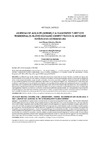Identificador persistente para citar o vincular este elemento:
https://accedacris.ulpgc.es/jspui/handle/10553/114464
| Título: | Viviendas de alquiler (AirBnB) y alojamientos turísticos tradicionales: nuevo escenario competitivo en el mercado turístico de Extremadura | Otros títulos: | Vacation rentals (AirBnB) and conventional tourist accommodation businesses: a new competition scenario in the Extremaduran tourist market | Autores/as: | Sánchez Martín, José Manuel Rengifo Gallego, Juan Ignacio Jiménez Barrado, Victor |
Clasificación UNESCO: | 531290 Economía sectorial: turismo 540401 Geografía urbana |
Palabras clave: | Airbnb Alquiler turístico Competencia desleal Economía colaborativa Extremadura, et al. |
Fecha de publicación: | 2019 | Publicación seriada: | Estudios Geográficos | Resumen: | La proliferación del alquiler turístico ha adquirido dimensiones importantes en muchos destinos, favorecida por algunas plataformas digitales como Airbnb. Su auge supone un incremento notable en la planta de hospedaje. De ello se deduce que es posible que actúen como competencia desleal, ya que no están sometidos a las normas que deben cumplir los alojamientos legales, desmitificando en este sentido el papel de la economía colaborativa para erigirse en un modelo de negocio más. Extremadura no ha sido ajena a esa tendencia, lo que hace que se haya planteado como hipótesis que la proliferación de este tipo de hospedaje profundiza en los problemas ocasionados por la competencia de establecimientos registrados, sobre todo en determinados tipos de alojamiento. Para comprobarla, se obtuvieron los alquileres promocionados en la plataforma digital, a la vez que se procedió a su georreferenciación, junto a la oferta registrada legalmente. Mediante una matriz de correlación se obtuvieron coeficientes que determinan una correspondencia importante entre el alquiler ilegal y las plazas ofertadas en hoteles y apartamentos turísticos, aunque al realizar el análisis territorial se observa cómo afecta a otras variedades de alojamiento, a la vez que tienen una clara vocación por las áreas más turísticas o sus proximidades. The proliferation of vacation rentals in private homes has grown out of proportion in many places—their increment being facili-tated by digital platforms such as Airbnb. This growing trend means a substantial rise in the number of available rooms. This may imply that this is a case of unfair competition, given that they are not subject to the same regulations of legal accommodation providers. Because of this, in turn, the myth of the sharing economy is largely debunked and it simply becomes another business model. Extremadura has been no stran-ger to this trend, a fact that has led to our working hypothesis: the proliferation of vacation rentals in private homes deepens the problems of competition among registered businesses—more so among specific types of accommodation providers. In order to test this hypothesis, the rentals available at the digital platform were retrieved. They were then georeferenced alongside the available rooms at registered businesses. Next, the data was analyzed in a correlation matrix that yielded a strong correlation between illegal rentals and the number of rooms offered by hotels and tourist apartments. However, when a geographical analysis was carried out, two issues become apparent: that the situation also affects other types of accommodation businesses and that it is especially prevalent in popular tourist areas and their surroundings. |
URI: | https://accedacris.ulpgc.es/handle/10553/114464 | ISSN: | 1988-8546 | DOI: | 10.3989/estgeogr.201925.005 | Fuente: | Estudios Geográficos [ISSN 1988-8546], v. 80 (286), enero-junio 2019, e005 |
| Colección: | Artículos |
Citas de WEB OF SCIENCETM
Citations
2
actualizado el 01-mar-2026
Visitas
34
actualizado el 10-ene-2026
Descargas
1
actualizado el 10-ene-2026
Google ScholarTM
Verifica
Altmetric
Comparte
Exporta metadatos
Los elementos en ULPGC accedaCRIS están protegidos por derechos de autor con todos los derechos reservados, a menos que se indique lo contrario.
